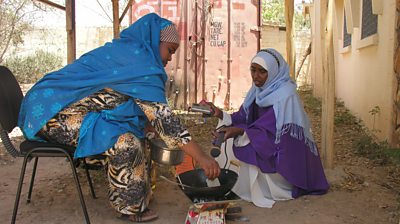More than 300,000 people in Somaliland [alone] tuned in regularly.
- Tiraarka Qoyska (Pillars of the Family) included a drama which explored key health issues, followed by an on-air discussion in which listeners could quiz health experts, community health workers and traditional and religious leaders.
- Broadcast on the ΒιΆΉΤΌΕΔ Somali service, the programmes were reinforced by short radio trails as well as training for health workers and radio listener groups.
- A large majority of the show's listeners told researchers they had learned something new about health, and had changed some of their daily habits as a result of listening to the programmes.
Nutrition and hygiene
Somalia has some of the worst maternal, neonatal and child mortality rates in the world. One in ten Somali children die before their first birthday and one woman in every 16 women dies from pregnancy-related causes.
Tiraarka Qoyska (Pillars Of The Family) used radio drama and discussion to improve peopleβs knowledge about nutrition and hygiene as well as encouraging them to adopt healthy habits.
Research was undertaken at each stage of the project: at the formative stage to understand target audiences and assess peopleβs knowledge; during pre-testing of the radio shows before broadcast; and quantitative and qualitative evaluation at the end of the project to measure impact.
Dramatic licence
The drama was set in a fictional camp for internally displaced people called Dareemo (which means βhayβ emphasising the programmeβs rural setting).
Characters were carefully crafted to reflect all three regions of the country β Somaliland, Puntland and South-Central Somalia β with some of them following traditional health beliefs while others opted for scientific treatments.
The drama brought to life a number of health-related issues, encouraging women to start breastfeeding within an hour after birth, for example, or communicating the importance of giving a child extra food and fluids when theyβre sick.
One of the fictional characters, a young woman called Istaahil, listens to her motherβs advice and gives water to her newborn baby, who, sadly, dies. When Istaahil becomes pregnant again, she reads a government pamphlet about the importance of exclusive breastfeeding, and after successfully winning over her sceptical mother, she has a healthy baby boy.
To extend the reach and impact of the programme, ΒιΆΉΤΌΕΔ Media Action trained more than 60 facilitators to conduct listening groups and developed βmedia toolkitsβ - consisting of information cards and audio recordings - for health workers to use when visiting families.
Changing lives
According to research conducted at the end of the project, one in five adults in Somaliland had listened to at least one of the programmes β which equates to almost half a million people in Somaliland alone. A majority of these people were regular listeners:
- More than 300,000 people in Somaliland tuned in regularly, with a majority coming from the more βhard-to-reachβ regions.
- Men - an important influence on childcare and child nutrition - were most interested in the discussion programme, while younger and older women preferred the drama.
- A large majority of listeners claimed they learned new things about health from the programme, and that they changed some of their daily habits as a result.
The mixed-methods impact evaluation showed that listening to Tiraarka Qoyska was associated with improved knowledge, positive attitudes and health practices among mothers of babies under one year old in Somaliland, in particular with regards to the prevention and treatment of illness.
| Project information | |
|---|---|
| Project name | Tiraarka Qoyska (Pillars of the Family) |
| Funder | The UK Government's Department for International Development |
| Dates | 2011-2014 |
| Themes | Health |
| Outputs | Tiirarka Qoyska (Pillars of the Family) |
| Broadcast partners | , |
